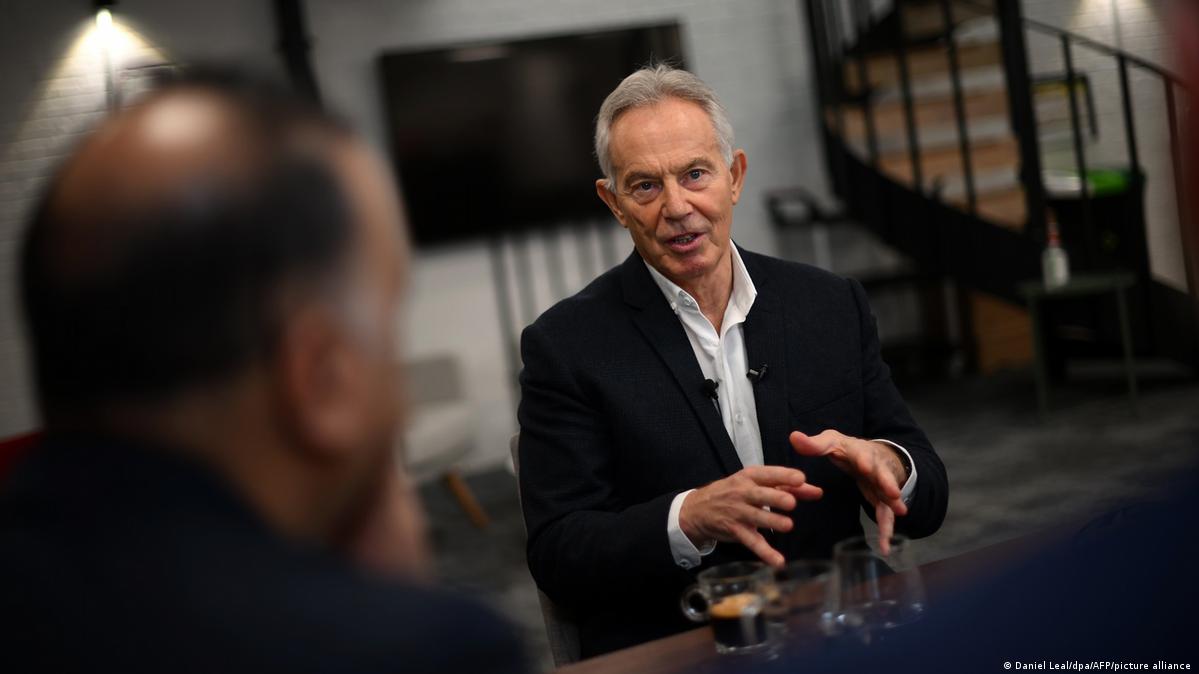CONFLICTSUKRAINE
Tony Blair: Putin can’t use Iraq to justify Ukraine invasion
2 hours ago2 hours ago
The former British prime minister rejected comparisons between Russia’s war in Ukraine and the US-led invasion of Iraq. He also chimed in over Brexit and the UK Conservative government’s current woes.
https://p.dw.com/p/4OtB5
Russia’s invasion of Ukraine cannot be equated with the US-led invasion of Iraq, former UK Prime Minister Tony Blair said Saturday, ahead of the 20th anniversary of the conflict that toppled Iraqi dictator Saddam Hussein.
Blair said Moscow’s forces had invaded “a country that has a democratically elected president who, to my knowledge, has never started a regional conflict or committed any aggression against its neighbours.”
The former British leader said Saddam Hussein, on the other hand, had brutalized his own people, engaged in two wars in violation of international law and used chemical weapons to kill 12,000 people in a single day.
“At least you could say we were removing a despot and trying to introduce democracy,” Blair told European news agencies AFP, dpa, ANSA and EFE.
The 69-year-old British politician conceded that Russian leader Vladimir Putin could try to use the Iraq invasion, which took place without a UN Security Council mandate, to justify his war of aggression.
“But, you know, if he didn’t use that excuse, he’d use another excuse,” Blair said.
West lost moral high ground by invading Iraq
Under Blair, Britain joined a coalition of countries — led by then-US President George W, Bush — in attacking Iraq on March 20, 2003. They did so without a formal declaration of war or a UN mandate.
The invasion took place in the wake of the September 11, 2001 attacks on New York and the US.
The goal of removing Saddam Hussein was soon achieved but Iraq quickly sank into a spiral of violence that lasted years and left hundreds of thousands of people dead.
The invasion also spurred some of the largest anti-war demonstrations in Britain.
Critics say the war was exposed as a reckless misadventure as no weapons of mass destruction, one of the British government’s main justifications for the operation, were found in Iraq.
The power vacuum ultimately allowed the self-proclaimed “Islamic State” to take control of large parts of the country for a few years.
Critics also argue that the Iraq war also hampered the West’s ability to stand up to Russian and Chinese autocracy credibly.
Blair’s greatest achievement made closer to home
If Iraq marked the low point of his 10-year administration, Blair said he thinks his role in mediating a peace agreement in Northern Ireland was his greatest legacy.
The signing of the Good Friday Peace Agreement on April 10, 1998, brought an end to the violence between Catholic nationalists seeking a united Ireland and Protestants loyal to Britain.
The preceding three decades of sectarian strife known as The Troubles had left some 3,500 people dead.
Blair was able to complete a process started by his Conservative predecessor, John Major, both of whom have been vocal about the risks of Brexit for peace in Northern Ireland.
He spent three days and nights negotiating the final stretch, alongside then-Irish premier Bertie Ahern and an envoy of US president Bill Clinton, finalizing a power-sharing arrangement among the communities.
Northern Ireland’s position as the only part of the UK with a shared border with European Union member, the Republic of Ireland, has at times reignited tensions between the communities following Britain’s departure from the EU.
But there are hopes a deal sealed last month between London and Brussels to regulate post-Brexit trade in Northern Ireland could help sooth tensions.
Blair comments on Brexit, Sunak
Turning to the wider issue of Brexit, Blair said he was certain that Britain would not rejoin the EU in the coming years.
“Whether and how the UK rejoins the EU will be for a future generation. I think that’s the reality,” he told the news agencies.
Blair also said he believed a shock win could not be ruled out for Prime Minister Rishi Sunak’s Conservatives, despite the party trailing the opposition Labour Party badly in the polls at present.
“In politics, you should never talk of certainties, because there aren’t any,” he said.
Labour, under leader Sir Keir Starmer, has an average 20-point lead on the center-left government after a series of scandals forced the resignation of Boris Johnson last summer while his successor Liz Truss lasted just 49 days in office.
Sunak, whose polished presentational style has been compared to Blair’s, was “repairing the damage that has been done” to the Conservative brand by his predecessors, Blair said.
mm/msh (AFP, dpa)






























